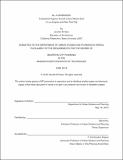All a diversion? : evaluating progress toward a Zero Waste goal in Los Angeles and New York City
Author(s)
Hiser, Jennifer M
DownloadFull printable version (18.56Mb)
Alternative title
Evaluating progress toward a Zero Waste goal in Los Angeles and New York City
Other Contributors
Massachusetts Institute of Technology. Department of Urban Studies and Planning.
Advisor
David Hsu.
Terms of use
Metadata
Show full item recordAbstract
In the last decade, the Zero Waste movement has emerged as a "visionary" approach to sustainable consumption and production. Promoting the transition from the linear system of 'take-make-dispose' to a closed-loop system where materials are reused continuously, Zero Waste advocates aim to conserve resources, protect health through material recovery, and improve the equity of material distribution. While the philosophy of Zero Waste is often commended for its comprehensive consideration of the environmental, social, and economic factors of waste, the movement has largely relied on a single indicator -- diversion rate -- to measure and guide progress. Diversion rates quantify the percentage of materials diverted from landfills or incinerators. For Zero Waste advocates, the goal is 90-100 percent diversion, which implies a very closed loop of material recovery. However, the term 'diversion' often describes a range of activities, such as reuse, recycling, and composting without any indication of whether materials are being diverted temporarily or indefinitely. This thesis uses a comparative case analysis to determine the strengths and limitations of the diversion rate as the primary performance indicator for Zero Waste in the management of municipal solid waste. Using semi-structured interviews with key informants and archival documents, the report compares Los Angeles and New York City, two cities that established diversion rate mandates more than 25 years ago and recently adopted Zero Waste goals. By analyzing the development of diversion activities in these two locations, the thesis establishes the need for more holistic evaluative methods and proposes upstream strategies to help municipalities transition to a sustainable, closed loop system.
Description
Thesis: M.C.P., Massachusetts Institute of Technology, Department of Urban Studies and Planning, 2016. This electronic version was submitted by the student author. The certified thesis is available in the Institute Archives and Special Collections. Cataloged from student-submitted PDF version of thesis. Includes bibliographical references (pages 182-192).
Date issued
2016Department
Massachusetts Institute of Technology. Department of Urban Studies and PlanningPublisher
Massachusetts Institute of Technology
Keywords
Urban Studies and Planning.